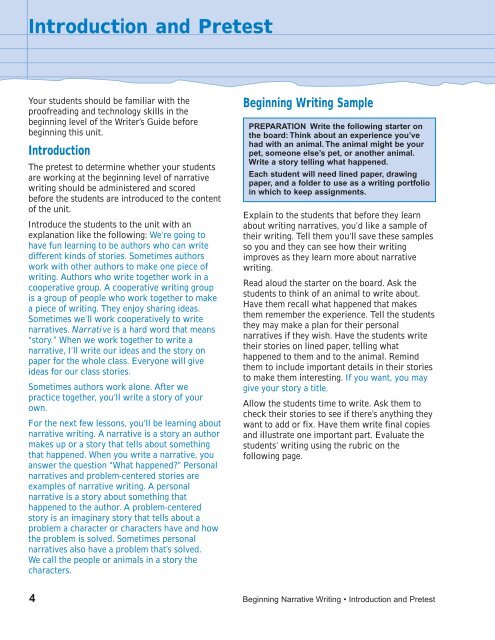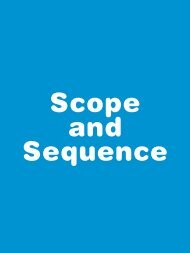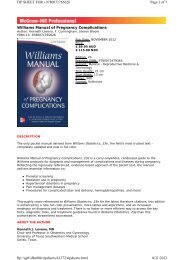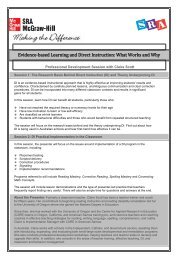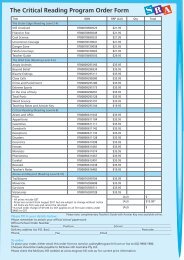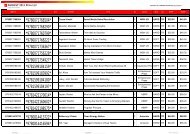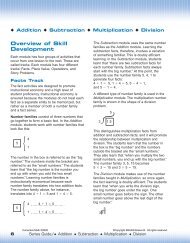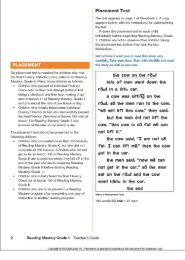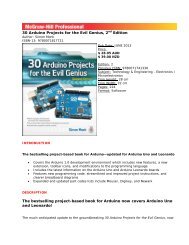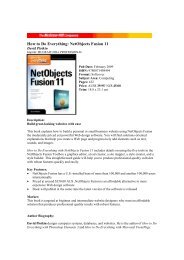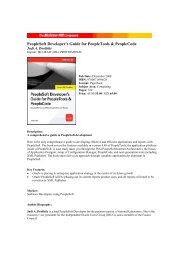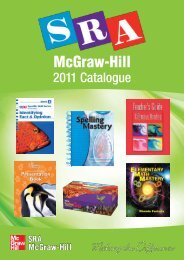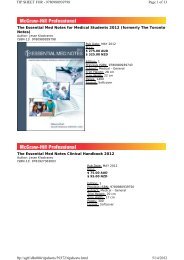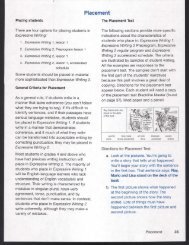Narrative - McGraw-Hill Australia
Narrative - McGraw-Hill Australia
Narrative - McGraw-Hill Australia
Create successful ePaper yourself
Turn your PDF publications into a flip-book with our unique Google optimized e-Paper software.
Introduction and Pretest<br />
Your students should be familiar with the<br />
proofreading and technology skills in the<br />
beginning level of the Writer’s Guide before<br />
beginning this unit.<br />
Introduction<br />
The pretest to determine whether your students<br />
are working at the beginning level of narrative<br />
writing should be administered and scored<br />
before the students are introduced to the content<br />
of the unit.<br />
Introduce the students to the unit with an<br />
explanation like the following: We’re going to<br />
have fun learning to be authors who can write<br />
different kinds of stories. Sometimes authors<br />
work with other authors to make one piece of<br />
writing. Authors who write together work in a<br />
cooperative group. A cooperative writing group<br />
is a group of people who work together to make<br />
a piece of writing. They enjoy sharing ideas.<br />
Sometimes we’ll work cooperatively to write<br />
narratives. <strong>Narrative</strong> is a hard word that means<br />
“story.” When we work together to write a<br />
narrative, I’ll write our ideas and the story on<br />
paper for the whole class. Everyone will give<br />
ideas for our class stories.<br />
Sometimes authors work alone. After we<br />
practice together, you’ll write a story of your<br />
own.<br />
For the next few lessons, you’ll be learning about<br />
narrative writing. A narrative is a story an author<br />
makes up or a story that tells about something<br />
that happened. When you write a narrative, you<br />
answer the question “What happened” Personal<br />
narratives and problem-centered stories are<br />
examples of narrative writing. A personal<br />
narrative is a story about something that<br />
happened to the author. A problem-centered<br />
story is an imaginary story that tells about a<br />
problem a character or characters have and how<br />
the problem is solved. Sometimes personal<br />
narratives also have a problem that’s solved.<br />
We call the people or animals in a story the<br />
characters.<br />
Beginning Writing Sample<br />
PREPARATION Write the following starter on<br />
the board: Think about an experience you’ve<br />
had with an animal. The animal might be your<br />
pet, someone else’s pet, or another animal.<br />
Write a story telling what happened.<br />
Each student will need lined paper, drawing<br />
paper, and a folder to use as a writing portfolio<br />
in which to keep assignments.<br />
Explain to the students that before they learn<br />
about writing narratives, you’d like a sample of<br />
their writing. Tell them you’ll save these samples<br />
so you and they can see how their writing<br />
improves as they learn more about narrative<br />
writing.<br />
Read aloud the starter on the board. Ask the<br />
students to think of an animal to write about.<br />
Have them recall what happened that makes<br />
them remember the experience. Tell the students<br />
they may make a plan for their personal<br />
narratives if they wish. Have the students write<br />
their stories on lined paper, telling what<br />
happened to them and to the animal. Remind<br />
them to include important details in their stories<br />
to make them interesting. If you want, you may<br />
give your story a title.<br />
Allow the students time to write. Ask them to<br />
check their stories to see if there’s anything they<br />
want to add or fix. Have them write final copies<br />
and illustrate one important part. Evaluate the<br />
students’ writing using the rubric on the<br />
following page.<br />
4 Beginning <strong>Narrative</strong> Writing • Introduction and Pretest
Name<br />
Date<br />
RUBRIC Pretest Posttest<br />
Scoring the Samples<br />
Give the student a score of 0 if there is no evidence of the element.<br />
Give the student a score of 1 for each element at the emergent or minimum level.<br />
Give the student a score of 3 for each element at a satisfactory level.<br />
Give the student a score of 5 for each element at the mastery level.<br />
Evaluating the Elements of <strong>Narrative</strong> Writing<br />
Copyright © SRA/<strong>McGraw</strong>-<strong>Hill</strong>. Permission is granted to reproduce this page for classroom use.<br />
O<br />
R<br />
G<br />
A<br />
N<br />
I<br />
Z<br />
A<br />
T<br />
I<br />
O<br />
N<br />
C<br />
O<br />
N<br />
T<br />
E<br />
N<br />
T<br />
S<br />
T<br />
Y<br />
L<br />
E<br />
M<br />
E<br />
C<br />
H<br />
A<br />
N<br />
I<br />
C<br />
S<br />
The author of this personal narrative . . .<br />
Includes a beginning paragraph.<br />
Includes one or more middle paragraphs.<br />
Includes an ending paragraph.<br />
Includes a chronological sequence of events.<br />
Chooses a title appropriate to the story.<br />
Includes a setting that tells where the story takes place.<br />
Includes a setting that tells when the story takes place.<br />
States the problem.<br />
States a solution to the problem.<br />
Describes the character’s feelings.<br />
Maintains a consistent point of view in the first person.<br />
Uses a variety of sentence beginnings.<br />
Uses adjectives to describe nouns.<br />
Uses adverbs that tell how, when, where, and why.<br />
Illustrates the story by drawing a picture that matches the content.<br />
Uses conventional spelling at a developmentally appropriate level.<br />
Capitalizes I, first and last names, and the first word of sentences.<br />
Uses correct punctuation to end declarative and interrogative sentences.<br />
Indents paragraphs.<br />
Uses past-tense verbs correctly.<br />
Total Points<br />
If the student scores . . .<br />
Points Earned<br />
85–100 points Administer the pretest for the intermediate level of <strong>Narrative</strong> Writing.<br />
20–84 points The student is properly placed in the beginning level of <strong>Narrative</strong> Writing.<br />
0–19 points Administer the placement test for Language for Learning, an SRA program,<br />
or place the student in a lower-level language program.<br />
Beginning <strong>Narrative</strong> Writing • Introduction and Pretest 5


